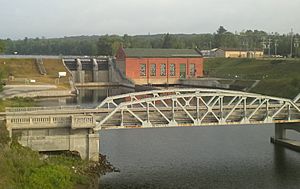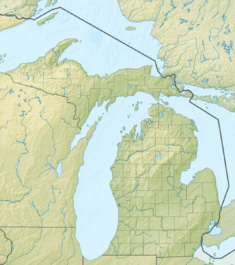Five Channels Dam facts for kids
Quick facts for kids Five Channels Dam |
|
|---|---|

The Five Channels Dam viewed from M-65
|
|
|
Location within the state of Michigan
|
|
| Location | Oscoda Township, Iosco County, Michigan |
| Coordinates | 44°27′19″N 83°40′36″W / 44.45526°N 83.6766°W |
| Opening date | 1912 |
| Dam and spillways | |
| Type of dam | Embankment dam |
| Power station | |
| Installed capacity | 6 MW |
|
Five Channels Dam Archeological District
|
|
| Lua error in Module:Location_map at line 420: attempt to index field 'wikibase' (a nil value). | |
| Nearest city | Oscoda, Michigan |
| Area | 45.1 acres (18.3 ha) |
| NRHP reference No. | 01001016 |
| Added to NRHP | March 13, 2002 |
The Five Channels Dam is a special kind of wall built across the Au Sable River in Michigan. It's a hydro-electric dam, which means it uses the power of moving water to create electricity.
Building the Five Channels Dam
A company called Consumers Power Company (now known as Consumers Energy) started building this dam in 1911. They finished it in 1912. This was the second of six dams they built along the Au Sable River.
The dam got its name because there used to be five different river channels nearby. Today, the dam's power plant can make 6,000 kilowatts of electricity. That's enough to power many homes!
Life at the Workers' Camp
Building a big dam like this needed many workers. So, a special camp was set up for them and their families. This camp was about 45 acres big.
The company wanted to keep the workers healthy and safe. They learned from big projects like the Panama Canal. The camp had its own water system, a way to handle waste, an icehouse, a school, and even a store. Workers could also build their own homes, from simple tents to log cabins.
Once the dam was finished, the camp buildings were either moved to the next dam construction site (the Loud Dam) or taken down.
A Historical Site
Even though the camp buildings are gone, the area where the workers lived is still important. It's now an archaeological site. This means experts can study the remains of the camp to learn about how people lived and worked there long ago.
On March 13, 2002, the site of the workers' camp was added to the National Register of Historic Places. This list includes important historical places in the United States.
Images for kids
 | Toni Morrison |
 | Barack Obama |
 | Martin Luther King Jr. |
 | Ralph Bunche |


